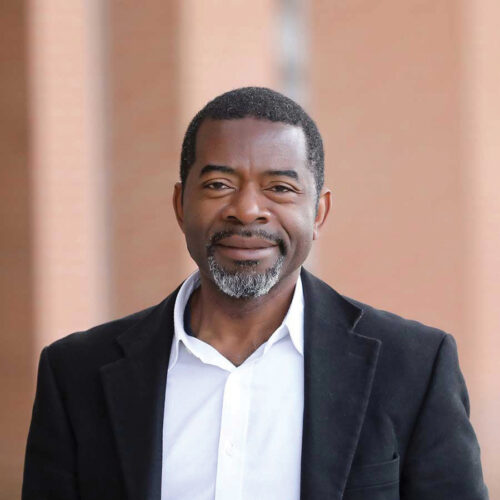Gerhard R. Andlinger Visiting Fellow engineers sustainable carbon materials for a greener future

Sustainable carbon materials specialist Ange Nzihou has joined the Andlinger Center for Energy and the Environment as a Gerhard R. Andlinger Visiting Fellow, strengthening the Center’s expertise in carbon capture, utilization, and sequestration.
A chemical engineer by training, Nzihou is a leader in carbon valorization — converting underused carbon resources like biomass and biowaste into valuable materials in the hopes of moving toward a more circular carbon economy.
“Carbon is a primary component of biomass and is among the most abundant chemical elements on Earth, but we tend to view biomass-based carbon as a source of waste,” Nzihou said. “Instead of treating these biomass streams as valueless, I work on ways to transform that carbon into useful products.”
Nzihou is a distinguished professor of chemical engineering at IMT Mines Albi – CNRS in France. For 10 years, he served as the chair of the chemical engineering department, growing its faculty and raising its visibility as a national and international leader in energy and environmental research. He also previously served as director of the RAPSODEE UMR CNRS 5302 Center (Albi Research Center in Process Engineering of Divided Solids, Energy and Environment), during which he forged research collaborations with researchers in China and India and established four joint research labs with international industry partners.
At Princeton, Nzihou will continue collaborations he first formed while visiting campus through the Fulbright Visiting Scholar Program in 2022. He will further develop past work with Claire White, associate professor of civil and environmental engineering and the Andlinger Center for Energy and the Environment, on the use of biomass to create sustainable graphene for applications in energy storage and carbon sequestration.
Additionally, Nzihou will work with Craig Arnold, the Susan Dod Brown Professor of Mechanical and Aerospace Engineering, to explore applications for sustainable carbon materials in agriculture. For instance, the two plan to engineer hierarchical biomass-derived carbon aerogels and xerogels that capture carbon dioxide, regulate soil moisture, and improve crop yields in arid regions around the world.
Nzihou also plans to work with Nan Yao, professor of the practice at the Princeton Materials Institute and director of Princeton’s Imaging and Analysis Center. Yao and Nzihou will collaborate to explore the nanostructure of the sustainable carbon materials that Nzihou develops.
During his fellowship, Nzihou also aims to establish new collaborations that unite the experience of scientists from across the University and the U.S. Department of Energy’s Princeton Plasma Physics Laboratory (PPPL) around the theme of sustainable carbon materials. For example, he plans to work with Yevgeny Raitses, managing principal research physicist at PPPL, to create biomass-derived carbon nanotubes using low-temperature plasma. Carbon nanotubes are cylinders of rolled-up graphene that have a wide range of applications, including in batteries, solar cells, and water purification systems.
“As a chemical engineer, you learn the fundamentals, which you can then apply to a number of domains,” Nzihou said. “Once you understand the basics, it’s easy to tune a material for energy, agriculture, or anything else, because the fundamental science behind each application is ultimately the same.”
Nzihou was recently awarded a European Research Council (ERC) Advanced Grant for a project to develop a biomass-based carbon material capable of recovering and storing waste heat from heavy industry. The ERC Advanced Grant is among the most competitive and prestigious research grants in Europe. Nzihou believes the grant will forge long-lasting research partnerships with the Andlinger Center and Princeton.
Beyond his research endeavors, Nzihou plans to organize a workshop dedicated to sustainable carbon materials, convening researchers across campus to identify research priorities and funding opportunities for bringing the world closer to a circular carbon economy.
“Princeton has a combination of excellence in science, teaching, social, and cultural life,” said Nzihou. “All of these dimensions come together to define the campus as a special place for me. It’s truly something wonderful.”
Related articles:
- Former Princetonian returns as visiting fellow to study energy efficiency in historic buildings
- Gerhard R. Andlinger Visiting Fellow to tackle stability issues in high-performance solar cells
- Biotechnologist Sarah Glaven joins Andlinger Center as Gerhard R. Andlinger Visiting Fellow to scale sustainable biomanufacturing